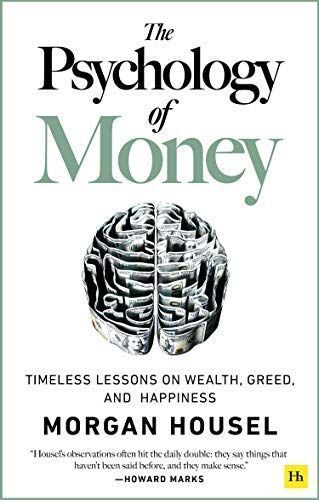
The Psychology of Money Timeless lessons on wealth, greed, and happiness
Doing well with money isn’t necessarily about what you know. It’s about how you behave. And behavior is hard to teach, even to really smart people. Money—investing, personal finance, and business decisions—is typically taught as a math-based field, where data and formulas tell us exactly what to do. But in the real world people don’t make financial decisions on a spreadsheet. They make them at the dinner table, or in a meeting room, where personal history, your own unique view of the world, ego, pride, marketing, and odd incentives are scrambled together. In The Psychology of Money, award-winning author Morgan Housel shares 19 short stories exploring the strange ways people think about money and teaches you how to make better sense of one of life’s most important topics.
Reviews
Xi Hui Teo@xiface
Adwait Kulkarni@adwaitkulkarni
Nathan Rogers@nxr_2002
catto fishu@catfish-lo
liya n@liya_reads
Sanjay Krishna @sjaykh
Reiza H@rererei93
Lewis Ngugi@ngeshlew
Felicia@feliciareads
ahmed@ahmd
Aaron Chiandet@achiandet
Jaiden Ratti@jaiden
Olga V@berrybell
Omar@omareduardo
Luca Moerenhoudt@lucam
Kyler Phillips@kyler
Kehinde Adeleke@adeleke5140
Sarah Schumacher@smschumacher
Jacob Medure@jacobs_blue
Jacopo Nardiello@jnardiello
Zia Nazaliah Ainisyifa@zianazaliah
Tuago@iagomr
Sumayya Tsabitah@mayya
Róbert Istók@robertistok
Highlights
Selena Yang@selenayang
Selena Yang@selenayang
Selena Yang@selenayang
Selena Yang@selenayang
Selena Yang@selenayang
Selena Yang@selenayang
Selena Yang@selenayang
Selena Yang@selenayang
Selena Yang@selenayang
Selena Yang@selenayang
Selena Yang@selenayang
Damian Makki@damianmakki
Page 15
Selena Yang@selenayang
Selena Yang@selenayang
Selena Yang@selenayang
Selena Yang@selenayang
Selena Yang@selenayang
Selena Yang@selenayang
Erin @erin_renee12345
Alp@alp
Page 154
Nkwachi Nwamaghinna@nkwachi
Simayon Thampi@simayon
Kyler Phillips@kyler
Kyler Phillips@kyler